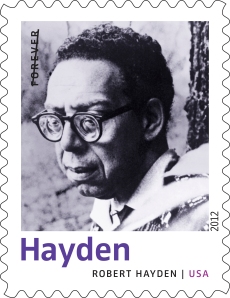The poems of Robert Hayden reflect his brilliant craftsmanship, his historical conscience, and his gift for storytelling. Many of his works, such as “Middle Passage” and “Runagate Runagate,” render aspects of the black American experience with unforgettable vividness. Others are more personal: “Those Winter Sundays” describes his father’s routine of rising early to tend to the fireplace and other chores, and becomes an appreciation for such habitual expressions of love.

Hayden was born Asa Bundy Sheffey on August 4, 1913, in Detroit, Michigan, where he grew up. He was still an infant when his biological parents gave him to a local couple, William and Sue Ellen Hayden, who raised him. He was bookish, wore thick eyeglasses, and was teased by other children; as an adolescent, he felt guilt and shame when his family received welfare assistance during the Depression.
He found consolation in poetry. He read the poets of the day, among them Carl Sandburg, Edna St. Vincent Millay, Countee Cullen, and Langston Hughes. Cullen, especially, was influential for the way his work combined racial awareness with a command of traditional poetics. By the time Hayden went to high school, he knew he wanted to be a poet.
As a student at Detroit City College (later Wayne State University), where he studied languages, Hayden published poems in the school paper. Beginning in 1936, he worked for the Federal Writers’ Project researching black history and folklore, giving him a store of knowledge from which he drew for his poems. His first book, Heart-Shape in the Dust, was published in 1940. Hayden would come to regard this collection of traditional, imitative verse as apprentice work.
In 1944, Hayden received his master’s degree in English from the University of Michigan at Ann Arbor, where he studied under W. H. Auden. In 1946, he took a job at Fisk University in Nashville, Tennessee, where he taught literature until 1968. The following year, he returned to the University of Michigan, where he was on the faculty until his death on February 25, 1980.
As Hayden’s books of mature work appeared—among them A Ballad of Remembrance (1962), Words in the Mourning Time (1970), Angle of Ascent: New and Selected Poems (1975), and American Journal (1978)—his reputation and popularity grew. He is now recognized as one of America’s foremost poets, the author of many works considered classics.
In the terrifying “Night, Death, Mississippi,” Hayden inhabits the mind of an old man who fondly recalls taking part in lynching. He pays tribute to singer Bessie Smith in “Homage to the Empress of the Blues” and brings a hackneyed commercial character to glorious life in “Aunt Jemima of the Ocean Waves.” One of Hayden’s most celebrated works, “Middle Passage,” presents a kaleidoscopic look at the slave trade. In “Runagate Runagate,” he imagines his way into the world of escaping slaves. (The word “runagate,” from renegade, was used to designate a runaway.) The latter poem features Harriet Tubman conducting passengers on the Underground Railroad “through swamp and savanna… / over trestles of dew, through caves of the wish,” with the “first stop Mercy and the last Hallelujah.”
In “Monet’s ‘Waterlilies’,” Hayden wrote about a painting he loved. He wrote several poems about his Bahá’í religious faith, which bolstered his belief in the oneness of all humanity and in the spiritual value of the arts. “[American Journal],” a longer piece from his final collection, was written from the point of view of an extraterrestrial visitor (who is indifferent to punctuation): “how best describe these aliens in my / reports to the Counselors”?
Hayden wanted to be known not as a black poet, but simply as an American poet.
Digital Color Postmark Keepsake (click to order)
“American life is a point of departure for me into an awareness of the universal,” he told an interviewer. In 1975, he was elected Fellow of the Academy of American Poets. He won many prizes, including several honorary degrees and an invitation to read at the Carter White House. In 1976, he was appointed Consultant in Poetry to the Library of Congress (the position later renamed Poet Laureate)—making him the first African American to receive this honor.
Robert Hayden is one of ten poets featured on the Twentieth-Century Poets pane. The stamps will be issued on April 21 in Los Angeles, California, but you can preorder them today!


